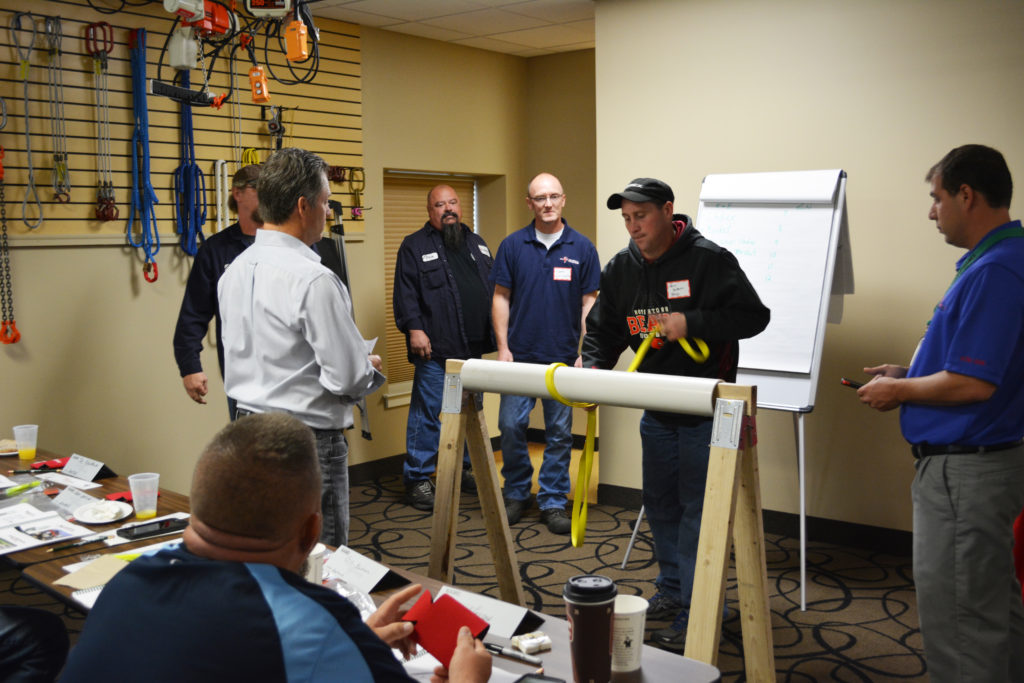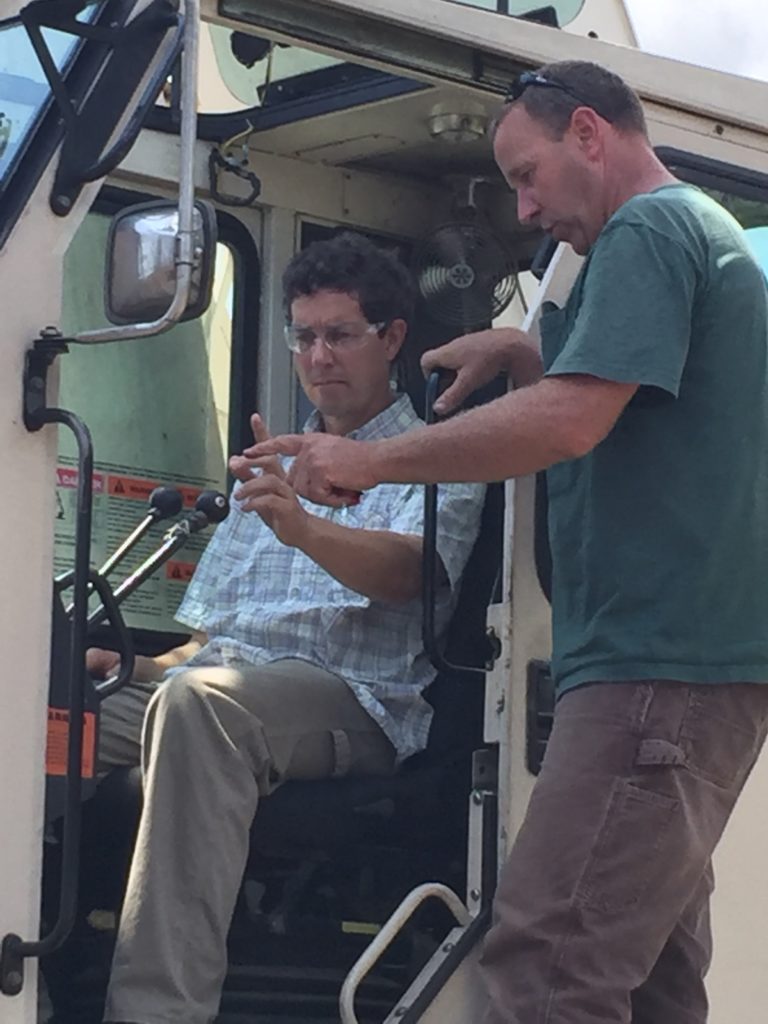Training
At RiggSafe Solutions, our purpose is to promote safe, useful training and efficient field references for the rigger, crane operator, job superintendent, engineer, planner and others involved in construction, building trades and maintenance industries.
Our trainees develop rigging competence through innovative programs that utilize a straightforward, practical approach to rigging. The techniques used by our instructors focus on the needs of the “blue collar” student by using well-illustrated, real world examples presented in a supportive environment. Unique from other training companies, RiggSafe Solutions sets out to prove whether good or poor rigging practices listed in standards or rigging books are accurate by testing those concepts. Integrity and quality guides RiggSafe Solutions as we utilize the latest rigging applications, innovative products and techniques to ensure that our students meet the challenges of today’s new demands for crane and rigging qualifications and certifications. RiggSafe Solutions recommends hand-on training for all courses.
Rigging Courses and Training
Rigging 101
This 4-hour basic rigging safety awareness and pre-use sling inspection course is designed to provide beginners and those who work in the vicinity of rigging activity the ability to recognize potential hazards, perform limited rigging tasks and pre-use inspections on wire rope slings, alloy chain slings, synthetic web slings, and synthetic roundslings.
Competent Rigger 1
This 8-hour rigging program instructs the participant in basic to intermediate rigging techniques, basic rigging math applications for symmetric loads, the effects of the load’s center of gravity (CG), and how to control the CG. The participant will be able to confidently perform frequent inspections on common slings and rigging hardware. Communication requirements and techniques are studied for mobile, tower, and overhead cranes.
The course workshops and instruction techniques are designed so the beginner is comfortable growing towards an advanced level of knowledge, while learning new skills.
Hands-on training is recommended with this course.
Competent Rigger 2
This 16-hour program instructs the participant in basic to advanced rigging techniques, rigging math, plus sling and rigging hardware application to symmetric and non-symmetric loads. The participant will learn how to calculate headroom, sling tensions and load weight calculations for common materials. In addition, CG control and calculations for the CG for symmetric and non-symmetric loads will be addressed in more detail than in Competent Rigger 1. The participant will confidently perform frequent inspections on common slings and rigging hardware. Communication requirements and techniques are studied for mobile, tower and overhead cranes.
The course workshops and instruction techniques are designed so the seasoned rigger can add to his/her knowledge and skill, while the beginner is comfortably growing to an advanced level of knowledge, while learning new skills.
Competent Rigger 1 is NOT a prerequisite for this training.
Competent Rigger 2 T&D (Power Transmission & Distribution)
This 14-hour rigging program instructs the participant in basic to advanced rigging techniques as described in Competent Rigger 1. Calculation of block loading and fair-lead tensions, as identified in transmission and distribution work, is covered.
Hands-on training is recommended with both Competent Rigger 1 & 2.
Professional Rigger
The Professional Rigger program consists of 24-hours of comprehensive study covering advanced rigging applications. This course prepares the participant to safely plan and perform rigging activity that has a high level of difficulty. The participant will be instructed on the calculation of centers of gravity, tensions applied to rigging gear used on symmetric and non-symmetric loads, headroom limitations, load weight estimation and horizontal load movement, mobile crane set-up, and load chart interpretation. The course will address different load handling equipment such as hoists, rollers, mobile, and overhead cranes. Workshops including center of gravity location, sling and hardware loading, rigging design, lift plan writing, lift plan review and presentation will utilize the knowledge learned throughout this training.
RiggSafe Solutions’ Competent Rigger 2 course or equivalent training or experience are necessary to gain the greatest value from this course. Participants should have a good working knowledge of center of gravity, sling tension and load weight calculations prior to taking Professional Rigger.
The course is structured for tradesmen and professionals who wish to increase their understanding of the science and the art of rigging. The course material is presented so that the participant can progress from simple to more complex problems.

Director Training and Courses
Lift Director Training
The Lift Director Training program consists of 24-hours of study that will prepare the experienced Supervisor, Rigging Engineer or Rigger to assume responsibilities as Lift Director. This course provides the training and skills necessary for the participant to review lift plans that will enhance safety and overall efficiency of lifts. The participant will learn personnel responsibilities, identify center of gravity for simple and complex lifts, tensions applied to rigging gear for symmetric and non-symmetric loads, headroom limitations, load weight estimation, correct rigging applications and personnel platform use. Also covered is mobile crane set-up, load chart interpretation and lift plan review workshops designed to enhance the Lift Director’s ability to identify and correct issues prior to executing the lift.
A written evaluation of course content will be completed at the end of the course to verify course knowledge.
Assembly/Disassembly (A/D) Director
The A/D Director program is designed to provide the A/D Director with the knowledge and understanding of requirements, responsibilities and ability to identify and mitigate associated hazards through physical and administrative controls. The A/D Director program uses active participation through workshops, review of manufacturers’ procedures as well as past accidents. The course provides validation of participants’ understanding and ability to define requirements of Occupational Safety and Health Administration (OSHA), American Society of Mechanical Engineers (ASME) as well as manufacturers’ assembly/disassembly procedures. The participant’s satisfactory completion of this course coupled with their field experience will ensure compliant and safe assembly and disassembly of mobile cranes.
Planning Crane & Rigging Activity
Lift Planning
This 4-hour course will review lift planning as prescribed by the ASME P30.1 Lift Plan Standard. Students will break into teams and create a lift plan using provided material. The workshop can be modified to use your company’s lift plan procedures, forms and a load handling activity performed by your company. Adding hands-on training with your equipment is a positive way to reinforce the information learned in this course. Ask us how this can be accomplished.
Hands-on activity with one of your lifting components is recommended for this training.
Rigging Engineer Review
The Rigging Engineer Review program consists of 24-hours of study designed to give engineers interested in the crane and rigging field a base knowledge and overview of industry standards as they relate to crane and rigging activity, rigging tools used for lifting loads, Load Handling Equipment (LHE) and the process of planning and reviewing crane and rigging activity. Participants will view videos of sling fabrication by sling fabricators. Participants will have the opportunity to experience a mobile crane operator’s view of an operating crane. No successful lift happens without proper planning. Discussions and workshops on lift plan writing and review will help the participant to understand the multiple facets and process of a load handling project.
Inspection Training & Courses
Competent Inspector 1
This 4-hour basic inspection course is designed to prepare the student to perform initial and frequent sling and common hardware inspections as per the applicable 29 CFR OSHA 1910 & 1926 and ASME B30 Standards.
Competent Inspector 2
This 8-hour inspection program covers periodic inspection criteria and techniques for slings and rigging hardware as described in 29 CFR OSHA 1910 & 1926, ASME B30.9, B30.10, B30.20, and B30.26 standards, along with manufacturer requirements.
Competent Inspector 2 will provide the knowledge and skill to meet all regulatory requirements. The training gained through this course will better prepare the individual to become a Qualified Inspector.
Qualified Inspector (Level 3)
This 2-day inspection program is a comprehensive study covering periodic inspection criteria and techniques for slings, rigging hardware and below-the-hook lifting devices as described in OSHA 1910 & 1926, ASME B30.9, B30.10, B30.20 and B30.26 along with manufacturer requirements.
The participant will gain the knowledge of sling and rigging hardware types, their correct applications, and to identify correctly fabricated sling assemblies. This is all part of the education process to developing one’s ability to confidently identify sling and hardware defects and failures, along with the probable causes of identified defects and failures.
Attendees will participate in the hands-on inspection of (field damaged) synthetic webbing slings, roundslings, wire rope slings, alloy chain slings, wire mesh slings, rigging hardware and below-the-hook lifting devices. You will find that Qualified Inspector (Level 3) is the most empowering and relevant sling and hardware inspection course available today.
Periodic Manual Hoist Inspection
This 4-hour program is an in-depth study on periodic inspection criteria and techniques for both manual lever and hand operated chain hoists. The course follows standards as described in ASME B30.16, B30.21, OSHA, HMI and manufacturer requirements. Designed to build the inspector’s confidence in inspection techniques and improve decision making skills, participants spend approximately half of the course in hands-on inspection and dismantling of lever and hand chain hoists.
Signalperson Training & Courses
Qualified Signalperson
This 8-hour program is designed to prepare the student to meet the requirements of OSHA 29 CFR 1926.1400. The student will be shown the proper methods to confidently communicate with the operator of mobile, tower and overhead cranes.
Course study includes hand and voice communication, crane functions and limitations, suspended personnel platforms and working near overhead power lines.
Crane Training & Courses
Overhead Crane Operation
This 2-day program prepares the student to operate overhead cranes with a clear understanding of crane use, movement and operational inspections. After classroom study, the student completes a frequent (pre-use) inspection of the crane and negotiates several operation scenarios until smooth, confident operation is attained.
As a minimum, we recommend that Competent Rigger 1 accompany this course.

Mobile Crane Operation
RiggSafe Solutions refers all mobile crane training to CTS (Crane Training Services) who provide the best crane training possible for our clients. CTS programs are designed to increase the crane operator’s knowledge, skill and proficiency level through classroom and hands-on training. The program covers OSHA and ASME requirements, interpreting load charts, pre-operational inspection, safe operating practices, operator responsibilities, and hand and voice communication.
CTS pre-operational inspections and load chart workshops can be customized, using your crane’s inspection criteria and load charts.
NCCCO Certification Training
NCCCO Certified Rigger Level 1
This 2-day program prepares the student for successful completion of the NCCCO Level 1 Rigger Certification testing program. Students will participate in classroom instruction and hands-on workshops designed to allow for both the understanding and ability of knot tying, inspection, and sling and rigging hardware connections. A practice test is given to students followed by a discussion of the correct answers and a review of the course material. After completion, students will not only be confident in their preparation for testing, but more importantly, they will be able to competently perform the job requirements of a Level 1 Rigger.
NCCCO Certified Rigger Level 2
This 2-day program prepares the student for successful completion of the NCCCO Level 2 Rigger Certification testing program. Throughout the course, students will complete extensive studies in the use of hitch application, calculating off-set center of gravity, and weight distribution. Additionally, students will learn methods of determining sling tension and the rotation of suspended loads. Classroom and hands-on workshops are utilized to prepare students for both testing and to confidently gain the skills critical to having a successful rigging career.
NCCCO Certified Signalperson
This 8-hour program is designed to prepare the student to meet the requirements of OSHA 29 CFR 1926.1400. Classroom and hands-on workshops are utilized to prepare students for both testing and to confidently communicate with the operators of mobile and tower cranes.
